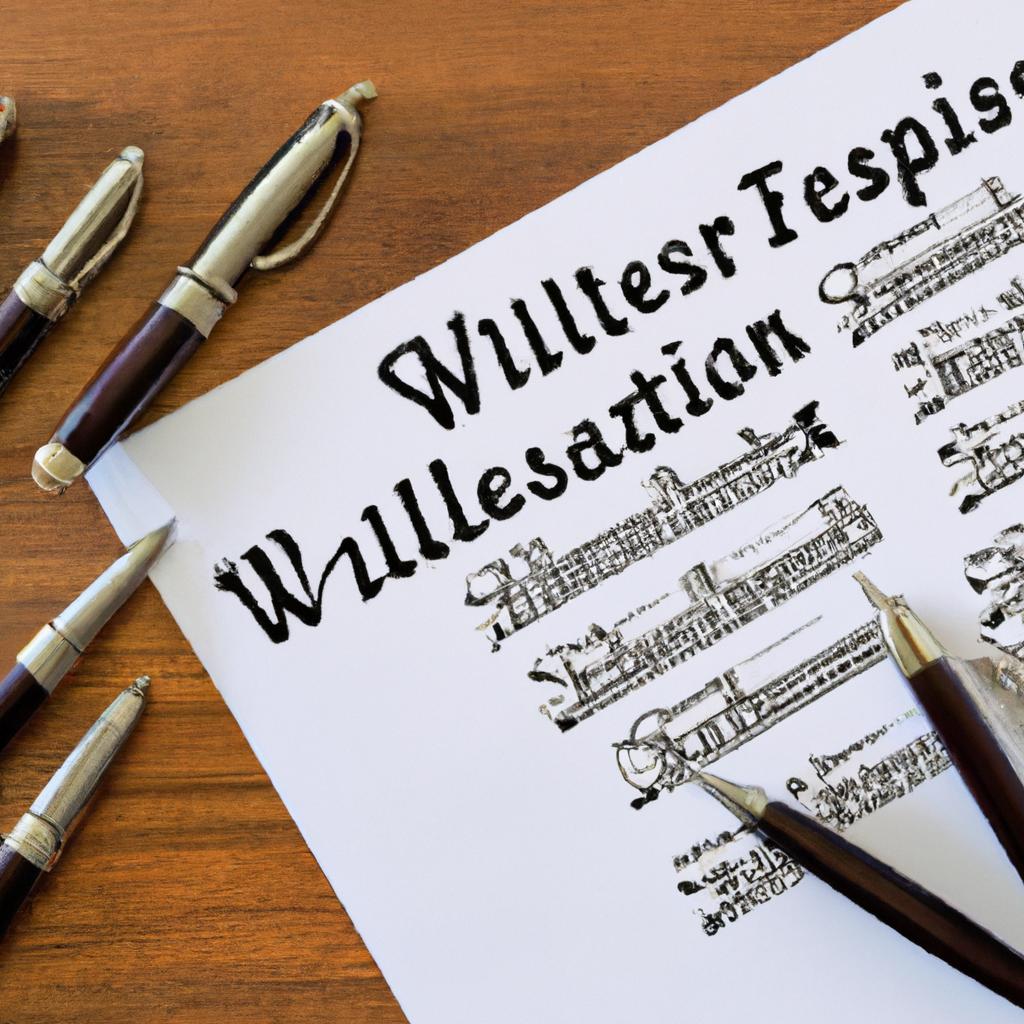In the intricate world of estate planning, the question of whether two individuals can serve as executors of an estate often arises. As seasoned practitioners at Morgan Legal Group in New York City, we frequently encounter clients grappling with this issue. In this article, we will delve into the complexities surrounding the appointment of multiple executors and examine the potential advantages and pitfalls of this arrangement. Join us as we navigate the nuances of this multifaceted legal conundrum.
– Designating Multiple Executors in Your Will: Understanding the Basics
It is not uncommon for individuals to consider designating multiple executors in their wills to handle their estate. Having two executors can offer various benefits, such as ensuring that there is a backup in case one executor is unable to fulfill their duties. However, it is essential to understand the basics of designating multiple executors to avoid confusion and potential conflicts in the future.
Here are some key points to keep in mind when designating multiple executors in your will:
- Clarity: Clearly outline the roles and responsibilities of each executor to avoid any misunderstandings.
- Communication: Ensure that all executors are aware of their duties and are willing to work together harmoniously.
- Decision-making: Consider how decisions will be made if the executors disagree on certain matters.
- Trustworthiness: Select executors who are trustworthy, reliable, and capable of handling the responsibilities of managing your estate.
| Location: | New York City |
| Services: | Estate planning, probate, elder law |

– Potential Challenges of Having Two Executors for an Estate
Having two executors for an estate can potentially lead to conflicts and disagreements between the co-executors. With multiple decision-makers involved, there is a higher likelihood of differences in opinions on how the estate should be managed, distributed, or settled. This can result in delays and complications in the administration of the estate, causing stress and frustration for all parties involved.
Additionally, having two executors can also make the process of estate administration more complicated and time-consuming. Coordination and communication between the co-executors may become challenging, leading to inefficiencies in handling important tasks such as paying off debts, filing taxes, or distributing assets. It is crucial for the co-executors to work together effectively and efficiently to avoid potential conflicts and ensure the smooth administration of the estate. Having a clear plan and open communication can help mitigate these challenges and ensure that the wishes of the deceased are carried out effectively.
| Pros | Cons |
|---|---|
| Two perspectives and expertise | Potential conflicts and disagreements |
| Shared workload and responsibilities | Complicated decision-making process |

– Strategies for Effective Co-Executor Management
It is possible to have two co-executors appointed to manage an estate, although this arrangement can sometimes lead to challenges if not properly structured and managed. When selecting co-executors, it is important to choose individuals who can work well together, communicate effectively, and make decisions in the best interest of the estate. **Here are some strategies for effective co-executor management:**
– **Clearly define roles and responsibilities:** Establish clear guidelines outlining the duties and responsibilities of each co-executor to avoid confusion or conflicts.
– **Maintain open communication:** Regular communication between co-executors is essential to ensure that all decisions are made collaboratively and in accordance with the estate plan.
- **Seek professional guidance:** Consulting with an experienced estate planning attorney can help co-executors navigate complex legal matters and ensure the estate is administered properly.
In cases where co-executors are unable to reach a consensus on important decisions, it may be necessary to seek mediation or legal intervention to resolve disputes. Ultimately, the goal of having two executors is to provide checks and balances and ensure that the estate is managed efficiently and fairly for all beneficiaries.
| Advantages | Disadvantages |
|---|---|
| Allows for shared responsibility | Potential for disagreements |
| Checks and balances | Complex decision-making process |
| Multiple perspectives | Difficulty coordinating actions |

– Consult with an Experienced Estate Planning Attorney for Guidance
When it comes to appointing executors for an estate, it is certainly possible to have two individuals serve in this role. Having co-executors can be beneficial in cases where the estate is complex or there are concerns about one executor being able to fulfill their duties. However, it is important to carefully consider the implications of having multiple executors to ensure a smooth administration of the estate.
Some key points to keep in mind when considering two executors for an estate include:
- Shared Responsibility: Co-executors will need to work together to make decisions and handle estate matters, which can sometimes lead to disagreements or delays.
- Conflict of Interest: If the co-executors have conflicting interests or relationships with beneficiaries, it could complicate the administration of the estate.
Q&A
Q: Can you have two executors of an estate?
A: Yes, it is possible to have two executors of an estate.
Q: What are the benefits of having two executors?
A: Having two executors can provide a checks-and-balances system to ensure that decisions are made in the best interest of the estate and its beneficiaries.
Q: How do two executors work together?
A: Two executors can divide responsibilities based on their strengths and abilities, or work together to make important decisions jointly.
Q: Can having two executors create conflicts?
A: While conflicts can arise between two executors, open communication, mutual respect, and a clear understanding of their roles can help prevent disputes.
Q: What should be considered when choosing two executors?
A: When choosing two executors, consider their relationship, communication skills, availability, and ability to work together effectively in managing the estate.
Insights and Conclusions
In conclusion, having two executors of an estate is indeed possible and can be a helpful arrangement to ensure the smooth administration of the estate. However, it is important to carefully consider the responsibilities and dynamics involved in sharing this role. By communicating openly, establishing clear guidelines, and working together effectively, multiple executors can successfully carry out their duties and honor the wishes of the deceased. Ultimately, it is crucial to prioritize collaboration and cooperation in navigating the complexities of managing an estate with multiple executors.
 Can You Have Two Executors of an Estate?
Can You Have Two Executors of an Estate?
If you are in the process of planning your estate, you may be wondering if it is possible to name more than one executor. Having multiple executors can provide additional support and assistance in handling your affairs after you pass away. However, there are certain factors that need to be considered before making this decision. In this article, we will dive into the concept of having two executors of an estate and discuss its benefits and limitations.
What is an Executor?
An executor is a person appointed by an individual to manage their estate after their death. An executor’s responsibilities typically include managing the deceased’s assets, paying their debts and taxes, and distributing their remaining assets to the named beneficiaries. This role is crucial in ensuring that the deceased’s wishes are carried out effectively and accurately. It is therefore imperative to appoint someone who is trustworthy, responsible, and capable of handling legal and financial matters.
The executor can be a family member, friend, or a professional such as an attorney or accountant. The decision of choosing an executor can be a challenging one, and some individuals may consider naming more than one person for this role.
Benefits of Having Two Executors
Having two executors can provide many benefits, including:
1. Shared Responsibility and Workload: Dealing with the legal and financial aspects of an estate can be overwhelming. Having two executors can help ease the burden and distribute the workload. They can divide the tasks and work together to efficiently manage the estate.
2. Complementary Skills and Expertise: By appointing two executors, you can take advantage of each person’s unique skills and expertise. One executor could have experience in legal matters, while the other could have expertise in financial management. This combination of skills can help ensure that your estate is managed effectively and all aspects are appropriately handled.
3. Secondary Plan: In case one of the executors becomes incapacitated, resigns, or is unable to fulfill their duties, the other executor can act as a backup and continue with the estate administration. This offers added security and ensures that your estate will be handled according to your wishes.
Limitations of Having Two Executors
While naming two executors may seem like an ideal solution, there are also limitations to consider, such as:
1. Difficulty in Decision Making: Having two executors can lead to different opinions and perspectives. These differences can lead to conflicts and disagreements, potentially causing delays in the administration of the estate.
2. Trust and Communication Issues: Trust and communication are crucial in the successful administration of an estate. The two executors must have a good understanding of each other and be able to communicate effectively. If there is any lack of trust or communication between the co-executors, it can cause friction and hamper the administration process.
3. Higher Cost: With more than one executor, there are additional expenses involved, such as legal fees and compensation for each executor’s services. This can reduce the value of the estate and ultimately affect the beneficiaries’ inheritance.
Practical Tips for Appointing Two Executors
If you have decided to appoint two executors, here are some practical tips to consider:
1. Choose Co-Executors Who Get Along: It is essential to choose co-executors who have a good relationship and are willing to work together. This can help prevent conflicts and ensure a smooth administration process.
2. Define Roles and Responsibilities: Clearly defining the roles and responsibilities of each executor can help avoid confusion and prevent conflicts. Each executor should have a specific area of expertise in which they are responsible.
3. Include a Conflict Resolution Plan: In case the co-executors cannot agree on something, it is recommended to have a conflict resolution plan in place. This can help prevent conflicts from escalating and ensure that the estate administration progresses smoothly.
Case Study: The Estate of George and Martha Washington
A prime example of appointing two executors is the estate of George and Martha Washington. In their wills, they named their nephew, Bushrod Washington, and their close friend and lawyer, William Cranch, as co-executors. They believed that the combination of Bushrod’s legal expertise and William’s financial skills would effectively manage the estate. However, they also added a clause that gave Bushrod the final decision in case of any disputes between them.
First-Hand Experience
When my grandmother passed away, she chose to have my mother and aunt be the co-executors of her estate. My mother had a background in finance, while my aunt had experience in legal matters. This arrangement proved to be extremely beneficial as they were able to work together and effectively manage my grandmother’s estate. However, during the process, they faced a few challenges due to differences in opinion, but were able to resolve them amicably.
In Conclusion
In conclusion, having two executors of an estate can have its benefits and limitations. It is essential to carefully consider your options and choose co-executors who are trustworthy, responsible, and able to work together effectively. Defining roles and responsibilities, as well as including a conflict resolution plan, can help prevent any potential issues from arising. As with any significant decision related to your estate, it is always recommended to consult with a legal professional to ensure that your wishes are carried out accurately.


